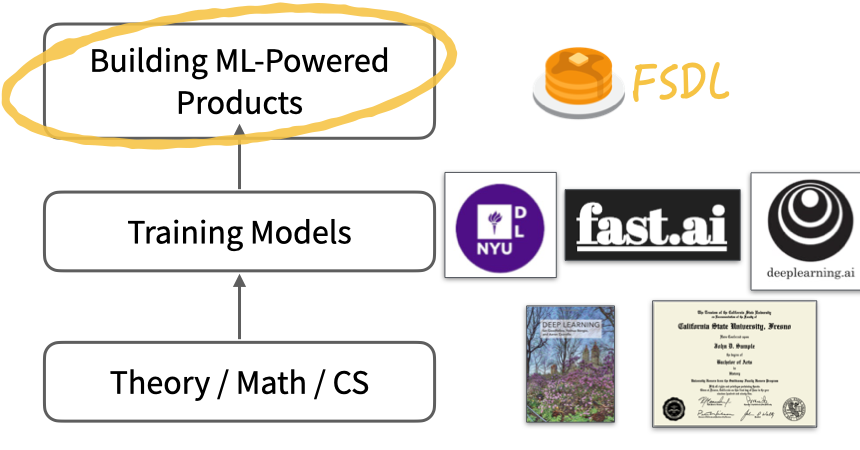Full Stack Deep Learning 2022 Course Announcement
Info
Looking for the latest edition of the course? Click here.
Want to be among the first to hear about future iterations of the course? Simply enter your email below, follow us on Twitter, or subscribe to our YouTube channel.
What you will learn
Our course incorporates feedback from thousands of learners over 5 years of teaching production machine learning.
We've updated all materials with best practices as of 2022 and added some brand new topics:
- Formulating the problem and estimating project cost
- Sourcing, cleaning, processing, labeling, synthesizing, and augmenting data
- Picking the right framework and compute infrastructure
- Troubleshooting training and ensuring reproducibility
- Deploying the model at scale
- ✨ Monitoring and continually improving the deployed model ✨
- ✨ How ML teams work and how to manage ML projects ✨
- ✨ Building on Large Language Models and other Foundation Models ✨

Labs
Through the first few weeks of the course, you will construct an end-to-end ML system, with best practices as of 2022.
- Applying CI/CD principles for clean, fast-moving ML
- Hypermodern training: PyTorch + Lightning + W&B
- Hypermodern deployment: Docker + AWS Lambda + Gradio
Project
Once the labs are done, you'll begin working on your own portfolio project. You'll create a working a working ML-powered application of your choice and share it with your fellow learners, getting feedback from course staff.
Selected projects will get the opportunity to share their work with the broader FSDL community.
Who is this for
ML Researchers and Engineers, MS students, software engineers looking to get into ML, data scientists looking to up their software engineering game, and PMs on ML teams will all benefit from materials in our course.
You will get the most out of this course if you have:
- At least one year of experience programming in Python.
- At least one deep learning course (at a university or online).
- Experience with code versioning, Unix environments, and software engineering.
- At least four hours a week to commit to learning, split across lectures, Q&A, labs, reading, and project work.
We review the fundamentals of deep learning (backprop, MLPs, CNNs, Transformers) in supplementary lectures released before the start of the course — but you should not expect to learn this material for the first time from these.
Testimonials
Instructors

Charles Frye teaches people on the internet. He worked in education and growth at Weights & Biases after getting a PhD in Neuroscience at UC Berkeley. He now works as a consultant, including for Gantry.

Sergey Karayev is Co-founder of Volition. He co-founded Gradescope after getting a PhD in Computer Vision at UC Berkeley.

Josh Tobin is Co-founder and CEO of Gantry. He worked as a Research Scientist at OpenAI and received a PhD in AI at UC Berkeley.
Registration
- 📹 Lecture and lab videos
- 🗣 Private Discord with instructors
- ❓ Weekly live online Q&A
- 💲 Compute credits
- 🎨 Team-based portfolio project with feedback
- 🏆 Certificate of completion
- 🔜 Starts August 8th, 2022
Bummed that you missed registration for the 2022 course?
To make sure you hear about the next iteration, enter your email below to sign up for our mailing list.
Cohort-Based Course FAQs
Read more about the 2022 synchronous cohort here.
How long is the course? How much time do I need to devote to it?
The course is 10 weeks long, from August 8, 2022 to October 14, 2022. During that time, you should expect to spend about four hours a week on the course. In the last four weeks, during which you'll be working on the project, devoting more time will result in a final project that you can be even more proud to put in your portfolio.
Which components of the course are synchronous? What days and times will synchronous events occur?
The Q&A sessions are synchronous. Their timing will be set based on student availability.
Lectures are pre-recorded, with the Q&A session serving as a live "flipped classroom" for discussing the lecture content.
Labs are available online, with a pre-recorded walkthrough video. We encourage students to form study groups, via the Discord server, for working on the lab material.
How do the projects work?
Teams of five will work for four weeks to build an ML-powered application of their choosing: a chatbot, an image editor, a natural language speech interface, or anything else you can imagine building with ML.
At the end, they will present their work to the rest of the class.
Project proposals and final projects will be reviewed by course staff. We'll provide detailed feedback, but grading will be done based on completion. The best projects will be featured by FSDL on YouTube, Twitter, and at our summits.
Questions about registration or the class that aren't answered here?
Tweet at us @full_stack_dl or email [email protected].
We are excited to share this course with you for free.
We have more upcoming great content. Subscribe to stay up to date as we release it.
We take your privacy and attention very seriously and will never spam you. I am already a subscriber



